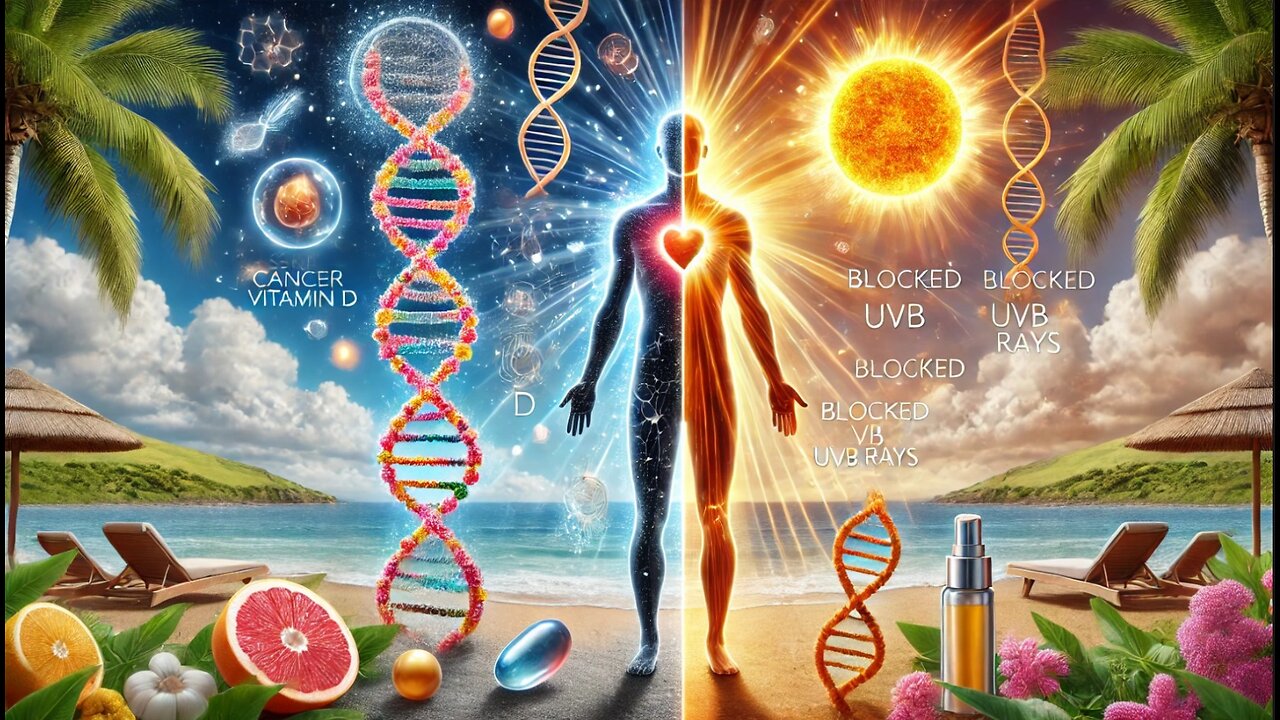Premium Only Content

The shocking truth about sunscreen, vitamin D, medical autonomy and climate interventions.
Article in Dutch and source info: https://vrijheidsberoving.nl/de-schokkende-waarheid-over-zonnebrandcreme-vitamine-d-medische-autonomie-en-klimaatinterventies/
Subtitle: What can we learn from Bill Gates and SCoPEx?
Sunscreen can increase the risk of skin cancer by blocking UVB rays, just as climate projects try to block the sun when we need solar energy.
But who is behind these contradictions?
The debate about the health benefits of vitamin D and the potential dangers of sunscreen has become increasingly heated in recent years, especially in times of crisis.
Vitamin D, which is often obtained through exposure to sunlight, has been found to be essential in preventing serious diseases such as cancer and heart disease.
This raises broader questions about our health choices and how they are regulated during pandemics and crises.
However, the issue extends beyond health care.
As discussions about medical autonomy flare up, another worrisome topic appears: attempts to block out the sun.
The dilemma of sunscreen: Are we blocking the good rays?
Recent studies suggest that sunscreen, once hailed for its protection against skin cancer, may actually increase the risk of this disease.
By filtering UVB rays, sunscreen hinders the production of vitamin D, while allowing harmful UVA rays to pass through.
This paradoxical effect can lead to an increased risk of skin cancer. Vitamin D, on the other hand, is crucial for health and can help reduce the chances of cancer and heart disease.
This raises important questions about how we approach health crises and what choices we make in treating diseases.
Medical autonomy during health crises: Lessons from COVID-19
During the COVID-19 pandemic, the tension between government guidelines and personal health choices came into sharp focus.
In the Netherlands, doctors who prescribed alternative treatments faced legal obstacles, raising the question of whether patients should have the right to choose their own treatments, even if they deviated from official guidelines.
The freedom to make well-informed choices based on scientific knowledge remains a crucial point in this discussion.
Climate Intervention: Blocking the sun – A dangerous experiment?
As the debate over medical freedom continues, another alarming phenomenon is emerging: attempts to block the sun through geoengineering.
The Stratospheric Controlled Perturbation Experiment (SCoPEx), funded by Bill Gates, is investigating the possibility of reducing sunlight on Earth by spraying calcium carbonate into the atmosphere.
The goal is to combat global warming by creating a reflective layer that reflects the sun's rays.
While this technology is intended to combat climate change, critics raise serious concerns about its potential impacts.
Just as sunscreen can block the absorption of vitamin D, manipulating the Earth's sunlight can have unforeseen effects on the climate and human health.
There is a risk that this intervention, intended to cool the Earth, could cause unexpected weather changes, similar to the disastrous effects of volcanic eruptions in the past.
Double standards?
There is another striking paradox: while world leaders are urging us to use solar energy, they are simultaneously working on projects to block the sun.
What does this mean for renewable energy sources such as solar panels, which rely on sunlight to generate energy?
This contradiction begs the question of why we should trust leaders who advocate for climate solutions that may do more harm than good.
Bill Gates, whose father was known as a supporter of population control, continues to influence global health and climate issues.
Critics point out that his involvement in projects such as SCoPEx could be part of a broader agenda that may be doing more harm than good.
What is the real motive behind these large-scale experiments?
And can we trust such powerful figures with the future of our planet and our health?
Conclusion.
The health benefits of vitamin D, the risks of sunscreen, and the potential for sun blocking by technology like SCoPEx raise important questions about how we treat our health and our planet.
Just as patients should have the right to make their own treatment choices, we must continue to look critically at large-scale climate interventions and their potential consequences.
We live in a time when truth and reality are often distorted.
It is therefore more important than ever to remain alert to the risks of both medical and technological developments.
-
 1:13:18
1:13:18
Wendy Bell Radio
7 hours agoPet Talk With The Pet Doc
42.4K62 -

dieseldesigns
5 hours agoExploring Labs In the DARK! // Abiotic factor
3.69K -
 LIVE
LIVE
BBQPenguin_
5 hours agoDragonball Z - The Android Saga
123 watching -
 LIVE
LIVE
Total Horse Channel
5 hours ago2025 URCHA Futurity | Derby & Horse Show | Saturday
38 watching -
 LIVE
LIVE
DynastyXL
5 hours ago🔴LIVE: Fortnite The Comeback Stream Starts Here🎃
42 watching -
 1:38:57
1:38:57
njgaming23
3 hours agoCoffee and Morning vibes #rumbletakeover
9.52K -
 1:09:19
1:09:19
Ami's House
2 days ago $18.19 earnedWhen Defending Israel Backfires: Are We Pushing Our Last Friends Away? With Karys Rhea
181K189 -
 8:13
8:13
WhaddoYouMeme
21 hours ago $1.57 earnedThis Gets More Tragic By The Second
13.3K10 -
 40:47
40:47
SouthernbelleReacts
3 days ago $1.94 earnedThe Faculty (1998) | Back-to-School Horror Movie Reaction | Alien Invasion in High School!
20.3K5 -
 6:58
6:58
Adam Does Movies
20 hours ago $0.60 earnedCaught Stealing - Movie Review
13.2K3